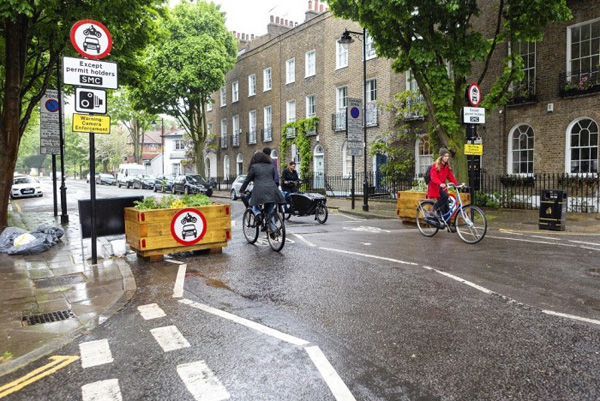Jodi Savickas and Rachel Hiorns, placemaking and sustainable transport specialists at AtkinsRéalis, argue that there is a way forward for low traffic neighbourhoods, but that community buy-in will be crucial for schemes to work.
People hold increasingly polarised opinions of liveable neighbourhoods (LN) and low traffic neighbourhoods (LTN), with the Government’s new review of the schemes putting them further in the spotlight. We believe that there is a way forward, but community buy-in will be crucial for schemes to work.
The depth of feelings associated with LNs and LTNs risks losing the support of the local community and delaying or preventing scheme implementation.
Theoretically, the underlying intention behind these schemes is to bring many benefits to the local community and improve quality of life, but some believe they will reduce their personal freedom to move and behave as they please.
So, how do we move forward in bringing opinions closer to a middle ground and enable successful scheme delivery?
Think local
 Schemes should be co-developed and co-designed with local residents and businesses to ensure they work for the local community.
Schemes should be co-developed and co-designed with local residents and businesses to ensure they work for the local community.
Schemes must work for local people and businesses. For some, the changes may feel as though they will have a significant negative impact, and we need to better understand and consider these impacts in scheme development.
Simply forcing changes on communities has resulted in tensions towards politicians and council officers and other negative outcomes.
Engagement with the community is required that is both meaningful and enables proposals to be shaped by local residents and businesses so their neighbourhood delivers improvements for their day-to-day experience.
Taking a structured approach to change
Given the sensitivities, convincing cynics and other community stakeholders is a vital element that local authorities need to consider, and they may need to approach these schemes differently to overcome the poor image of schemes like some of the LTNs.
Our suggested approach is set out in three stages, named the 4C’s: complexities, communication and comfortable change.
Complexities
 There needs to be an understanding of travel behaviours to plan a scheme, but do we really understand the true complexities for all types of movement?
There needs to be an understanding of travel behaviours to plan a scheme, but do we really understand the true complexities for all types of movement?
Using data that focuses on travel behaviours during peak times will capture just a snapshot of travel purposes across a day, with many trips and movements around neighbourhoods not fully considered or understood.
Why do some people walk that particular route? Is it to avoid areas deemed unsafe? Why do some people drive along that street? Is it because they have multiple stops to make, dependent people to transport, or lots of items to carry?
Until we gather qualitative data to enable a deeper understanding of how people use their neighbourhoods, can we really begin to understand people’s needs; and why they might be opposed to schemes that change their existing behaviours?
Communication
Schemes can meet many cross-cutting social, economic and environmental objectives; however, the benefits need to resonate with people by understanding the impact on their daily lives. After understanding the complexities of movement, this enriched data can enable the creation of ‘personas’ that reflect the characteristics and behaviours of people and how the schemes may impact them.
This can be used to better communicate the benefits of schemes more meaningfully and make them personal to people who can identify with a particular persona type.
Comfortable Change
Strong opposition often comes when a movement that someone makes daily is, in some way, limited and they’re forced to change. Once there is a greater understanding of how people use their neighbourhood, measures can be co-designed with the community.
A comfortable change approach can implement co-designed schemes in a phased way to allow people to get comfortable and see the increased choices available for how to move around and enjoy the neighbourhood, before potentially making incremental adjustments to progress further.
Initial measures could be improved crossing points, continuous footways, speed restricting measures and place shaping measures, which can begin to change the feeling of the place to indicate that active travel and placemaking are priorities and that vehicles are guests in these spaces.
But the key is that vehicle movement is not immediately restricted, and people who drive along these streets can still use them as they always have, albeit with a different ‘feel’.
As these changes become more comfortable within the community, continued dialogue will be able to establish whether more ambitious steps can be taken to develop the scheme further.

By following the 4C stages, local authorities can develop a better understanding of the complexities of people’s daily lives and identify reasons for movements and behaviours. This data can be used to shape the vision for the scheme, from which the benefits can be tailored to resonate meaningfully with citizens and show how proposals could positively impact lives.
Through maintaining continuous community dialogue, a ‘softly, softly’ comfortable change may not be needed. If the vision of the scheme is developed knowing the complexities of movements and how they would be affected and communicated in a meaningful way, more ambitious and visionary schemes could prosper, with support, rather than having to wait years for construction and implementation to see the benefits.
Jodi Savickas (top picture) and Rachel Hiorns (also pictured) are placemaking and sustainable transport specialists at AtkinsRéalis





